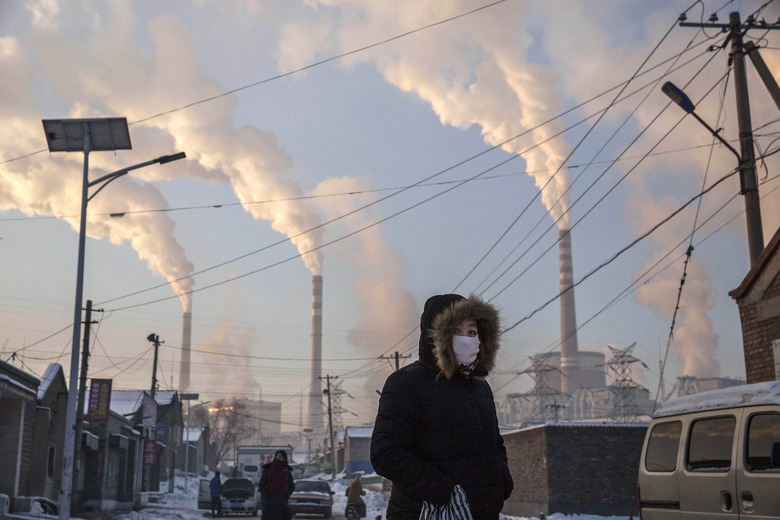What Is The Difference Between Human & Natural Air Pollution?
The major difference between natural and man-made air pollution is that continuous or temporary natural events cause natural air pollution, but human activities are responsible for man-made pollution. We can't prevent natural air pollution from sources like volcanoes, but we can reduce man-made pollutants and their consequences: respiratory diseases, acid rain and global warming.
In the Air
In the Air
Air pollutants are gases and particles that harm people or other life, damage materials or reduce visibility. Some air pollution comes from volcanic eruptions, forest fires and hot springs, but most is the result to human activities. Power plants, factories, cars and trucks emit carbon dioxide, carbon monoxide, hydrocarbons, sulfur dioxide, nitrogen dioxides and particulate matter that consists of fine particles suspended in the air. Burning oil, coal, gasoline and other fossil fuels is a major cause of man-made air pollution. Other man-made sources of air pollution include:
- waste disposal
- dry cleaning
- paints
- chemical manufacture
- wood stoves
- flour mills
Natural Sources of Air Pollution
Natural Sources of Air Pollution
Natural air pollutants include radon, fog and mist, ozone, ash, soot, salt spray, and volcanic and combustion gases. Radon is a radioactive gas that seeps from the ground in some areas, and fog and mist are both dense water vapor at ground level that obscures vision. Ozone, a chemical formed naturally by the action of sunlight on oxygen, is a pollutant at ground level but beneficial in the upper atmosphere. A molecule made of three oxygen atoms, ozone shields the Earth from harmful ultraviolet rays from the sun, but it damages plants and causes breathing problems in the lower atmosphere. Volcanic eruptions and forest, swamp and grass fires launch soot and ash into the atmosphere, which reduces sunlight and lowers temperatures. Eruptions and fires also produce carbon dioxide, carbon monoxide and other polluting gases.
Air Pollution Effects
Air Pollution Effects
Natural and man-made air pollution harm humans, other life and the environment. Particulate matter from burning wood and fossil fuels lodges in lungs, causing respiratory problems, and settles in a fine film over buildings, trees and crops. Carbon monoxide interferes with the blood's ability to transport oxygen and causes headaches, heart damage and death. Sulfur dioxide, which is a product of burning coal, irritates eyes, damages lungs and makes rain acidic. Acid rain damages buildings and forests and kills aquatic life. Another contributor to acid rain is nitrogen dioxide emitted by vehicles, industrial boilers and other industrial processes. Lead from leaded gasoline, power plants and metal refineries contaminates crops and livestock and causes brain and kidney damage.
Global Warming
Global Warming
Greenhouse gases that cause global warming have increased 31 percent since preindustrial times. Carbon dioxide and other gases trap heat in the atmosphere, causing global temperatures to rise. Although carbon dioxide has natural sources, such as volcanic eruptions, human activities have caused an increase from 280 parts per million before the development of industry to 370 parts per million today. Other greenhouse gases include methane and nitrous oxide — which human activities also produce — that have contributed to a 0.6 degree Celsius (1 degree Fahrenheit) increase in the global air surface temperature in recent decades. Particulate matter from vehicles, factories, fires and eruptions cools the atmosphere, but researchers at the National Center for Atmospheric Research still predict a 90 percent chance that human activities will cause a 1.7 to 4.9 degree Celsius (3.1 to 8.9 degree Fahrenheit) increase in global temperatures by 2100.
Cite This Article
MLA
Green, Jenny. "What Is The Difference Between Human & Natural Air Pollution?" sciencing.com, https://www.sciencing.com/difference-between-human-natural-air-pollution-23687/. 23 April 2018.
APA
Green, Jenny. (2018, April 23). What Is The Difference Between Human & Natural Air Pollution?. sciencing.com. Retrieved from https://www.sciencing.com/difference-between-human-natural-air-pollution-23687/
Chicago
Green, Jenny. What Is The Difference Between Human & Natural Air Pollution? last modified March 24, 2022. https://www.sciencing.com/difference-between-human-natural-air-pollution-23687/
